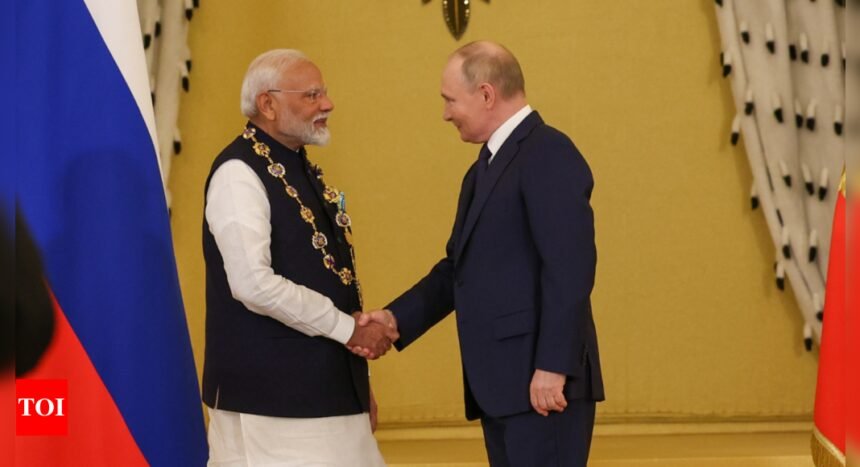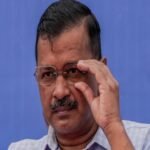India remains a strategic partner for the United States despite concerns over its relations with Russia, affirmed the Biden Administration.
The statement follows Prime Minister Narendra Modi‘s recent visit to Russia for the 22nd India-Russia annual summit, which was closely monitored by the West amid the ongoing Ukraine conflict. During talks with Russian President Vladimir Putin, PM emphasized that solutions to the Ukraine conflict cannot be achieved on the battlefield and stressed the necessity of peace efforts.
Pentagon, White House, and State Department spokespersons separately addressed India’s ties with Russia and PM’s Moscow visit. “India and Russia have had a relationship for a very long time. From a US perspective, India is a strategic partner with whom we continue to engage in full and frank dialogue to include their relationship with Russia,” said Pentagon press secretary Major General Pat Ryder at a news conference, as quoted by news agency PTI.
Discussing the broader implications of PM’s visit, Ryder said, “I do not think anybody will be surprised if (Russian) President (Vladimir) Putin tries to represent this visit in a way that seeks to somehow show that he is not isolated from the rest of the world. And the fact of the matter is President Putin’s war of choice has isolated Russia from the rest of the world, and it has come at great cost. Their war of aggression has come at great cost, and the facts bear that out.”
Ryder reassured, “We will continue to view India as a strategic partner. We will continue to have a robust dialogue with them.” In response to a reporter’s suggestion that PM Modi’s visit could challenge perceptions of Putin’s isolation, Ryder pointed out PM Modi’s recent meeting with Ukrainian President Volodymyr Zelenskyy, during which he assured that India will continue to support a peaceful solution for Ukraine. “I think that we trust that India will support efforts to realise an enduring and just peace for Ukraine and will convey to Putin the importance of adhering to the UN charter and the principles of sovereignty and territorial integrity,” Ryder elaborated.
US state department spokesperson Matthew Miller, speaking at his daily news conference said, “We have expressed those privately directly to the Indian government, and continue to do so. And that has not changed.”
Reiterating US’s stance on encouraging India’s support for peace in Ukraine, he said, “We continue to urge India to support efforts to realise an enduring and just peace in Ukraine, based on the principles of the UN charter, based on upholding Ukraine’s territorial integrity and its sovereignty. And that will continue to be what we will engage with India about.”
Miller had called India a “strategic partner” in the past as well. “India is the world’s largest democracy, it is an important strategic partner of the United States, and I expect that to remain true,” he had said in April.
White House Press Secretary Karine Jean-Pierre reiterated that India is a strategic partner and said that “it’s critical that all countries, including India, support efforts to realise an enduring and just peace when it comes to Ukraine.” She also pointed out India’s unique position, stating, “We also believe India’s long-standing relationship with Russia gives it the ability to urge the president, President Putin, to end his brutal war, an unprovoked war in Ukraine. It is for President Putin to end. President Putin started the war and President Putin can end the war.”
US State Department Hindustani spokesperson, Margaret MacLeod urged India to use its “special partnership” with Russia to talk about the war with Ukraine. Speaking to news agency ANI on Tuesday, MacLeod said, “The US is urging all its partners, including India to pressurise Russia for lasting peace in Ukraine. Russia should get out of Ukraine, This is not the era of war, as Prime Minister (PM Modi) has said.”
India has consistently defended its “special and privileged strategic partnership” with Russia despite the Ukraine conflict. PM Modi was also conferred the highest civilian award of Russia on July 9. Also, India has yet to condemn Russia’s 2022 invasion of Ukraine and continues to advocate for resolving the conflict through dialogue and diplomacy.
The statement follows Prime Minister Narendra Modi‘s recent visit to Russia for the 22nd India-Russia annual summit, which was closely monitored by the West amid the ongoing Ukraine conflict. During talks with Russian President Vladimir Putin, PM emphasized that solutions to the Ukraine conflict cannot be achieved on the battlefield and stressed the necessity of peace efforts.
Pentagon, White House, and State Department spokespersons separately addressed India’s ties with Russia and PM’s Moscow visit. “India and Russia have had a relationship for a very long time. From a US perspective, India is a strategic partner with whom we continue to engage in full and frank dialogue to include their relationship with Russia,” said Pentagon press secretary Major General Pat Ryder at a news conference, as quoted by news agency PTI.
Discussing the broader implications of PM’s visit, Ryder said, “I do not think anybody will be surprised if (Russian) President (Vladimir) Putin tries to represent this visit in a way that seeks to somehow show that he is not isolated from the rest of the world. And the fact of the matter is President Putin’s war of choice has isolated Russia from the rest of the world, and it has come at great cost. Their war of aggression has come at great cost, and the facts bear that out.”
Ryder reassured, “We will continue to view India as a strategic partner. We will continue to have a robust dialogue with them.” In response to a reporter’s suggestion that PM Modi’s visit could challenge perceptions of Putin’s isolation, Ryder pointed out PM Modi’s recent meeting with Ukrainian President Volodymyr Zelenskyy, during which he assured that India will continue to support a peaceful solution for Ukraine. “I think that we trust that India will support efforts to realise an enduring and just peace for Ukraine and will convey to Putin the importance of adhering to the UN charter and the principles of sovereignty and territorial integrity,” Ryder elaborated.
US state department spokesperson Matthew Miller, speaking at his daily news conference said, “We have expressed those privately directly to the Indian government, and continue to do so. And that has not changed.”
Reiterating US’s stance on encouraging India’s support for peace in Ukraine, he said, “We continue to urge India to support efforts to realise an enduring and just peace in Ukraine, based on the principles of the UN charter, based on upholding Ukraine’s territorial integrity and its sovereignty. And that will continue to be what we will engage with India about.”
Miller had called India a “strategic partner” in the past as well. “India is the world’s largest democracy, it is an important strategic partner of the United States, and I expect that to remain true,” he had said in April.
White House Press Secretary Karine Jean-Pierre reiterated that India is a strategic partner and said that “it’s critical that all countries, including India, support efforts to realise an enduring and just peace when it comes to Ukraine.” She also pointed out India’s unique position, stating, “We also believe India’s long-standing relationship with Russia gives it the ability to urge the president, President Putin, to end his brutal war, an unprovoked war in Ukraine. It is for President Putin to end. President Putin started the war and President Putin can end the war.”
US State Department Hindustani spokesperson, Margaret MacLeod urged India to use its “special partnership” with Russia to talk about the war with Ukraine. Speaking to news agency ANI on Tuesday, MacLeod said, “The US is urging all its partners, including India to pressurise Russia for lasting peace in Ukraine. Russia should get out of Ukraine, This is not the era of war, as Prime Minister (PM Modi) has said.”
India has consistently defended its “special and privileged strategic partnership” with Russia despite the Ukraine conflict. PM Modi was also conferred the highest civilian award of Russia on July 9. Also, India has yet to condemn Russia’s 2022 invasion of Ukraine and continues to advocate for resolving the conflict through dialogue and diplomacy.








